Five airlines that fly into remote Northern Manitoba communities will receive a total of more than $12 million in federal funding to cover pandemic-related losses in the last six months of 2020 and help ensure that service levels are maintained.
The airlines receiving funding include Calm Air, Perimeter Aviation, Northway Aviation, Missinippi Air and Amik Aviation. Calm Air and Perimeter Aviation, both owned by Exchange Income Corporation (EIC), will receive about about three-quarters of Manitoba’s funding allocation – $8.99 million, nearly $7 million of it directed at Perimeter.
“Ensuring that people and cargo can get in and out of remote Northern Manitoba communities is at the core of what our airlines do and we’ve been proud to maintain this essential service since the start of the pandemic,” said EIC CEO Mike Pyle in a provincial government news release. “I’m pleased that the federal and provincial governments are partnering with our airlines to ensure they can continue to be there to support Manitobans as we all weather the rest of this crisis.”
The federal government announced in August that it was seeking agreements with provinces and territories to ensure 140 northern and remote communities had adequate airline service.
“This investment will ensure communities in Manitoba remain connected and supported with access to essential goods and services when they need it the most,” said federal Northern Affairs Minister Dan Vandal.
The funding announced Feb. 1 will maintain scheduled service to 21 remote communities, including many Northern Manitoba First Nations that do not have year-round road access. The distribution of the funding was determined by the provincial government.
“In regions where there are no roads connecting communities, air service must remain operational as residents depend on this service for essential goods in an out of their communities,” said Manitoba Indigenous and Northern Relations Minister Eileen Clarke.
The Assembly of Manitoba Chiefs (AMC), which represents 63 First Nations in the province, welcomed the funding arrangement.
“For our remote and isolated First Nations, the airlines provide a lifeline to the outside world, ensuring that goods and services are transported in and out of communities, while providing critical medical evacuations as required,” said AMC Grand Chief Arlen Dumas, noting that the COVID-19 pandemic is disproportionately affecting First Nations people in Manitoba during its second wave.
In the summer, the federal government said it was committing up to $75 million for airlines over the first six months of the funding arrangement and up to $99 million over the subsequent 12 months, if needed. Passenger numbers on small airlines that service remote communities dropped by more than 90 percent over the first few months of the pandemic, reducing revenue that previously helped subsidize the cost of transporting essential cargo on the same planes.
Manitoba Infrastructure Minister Ron Schuler said in a Jan. 22 news release that northern communities would soon have access to the winter road network, which covers 2,381 kilometres, connects 30,000 Manitobans in 22 communities to the rest of the province and sees more than 2,500 shipments of goods, including construction materials, fuel and heavy equipment, while it is operational, which can be as long as two months depending upon weather conditions.




